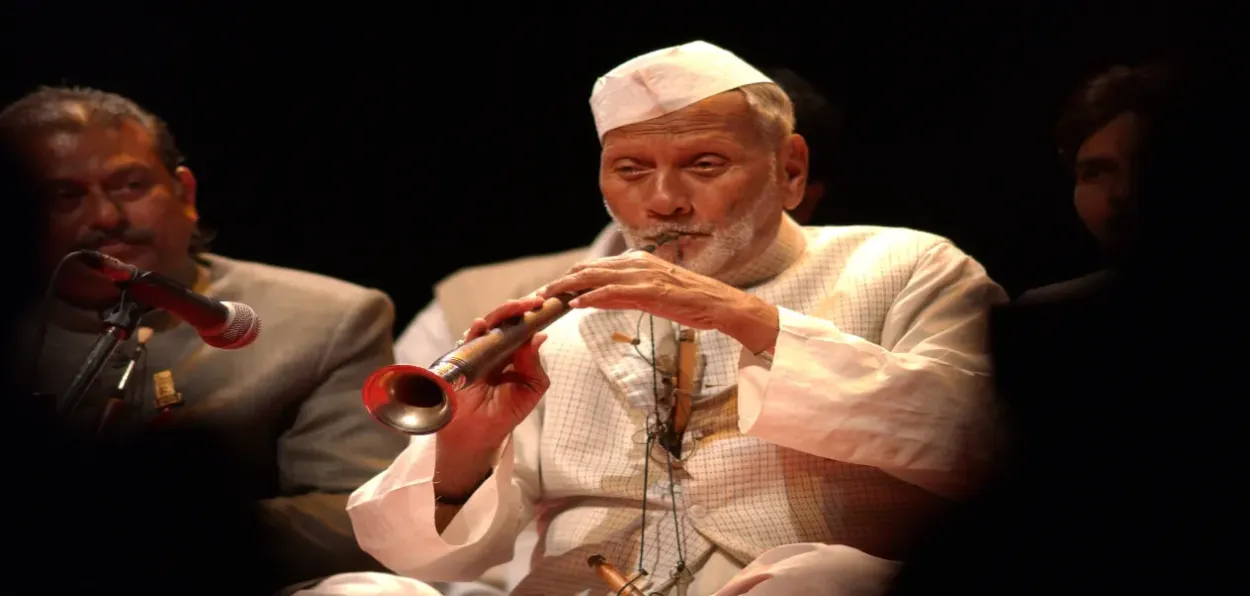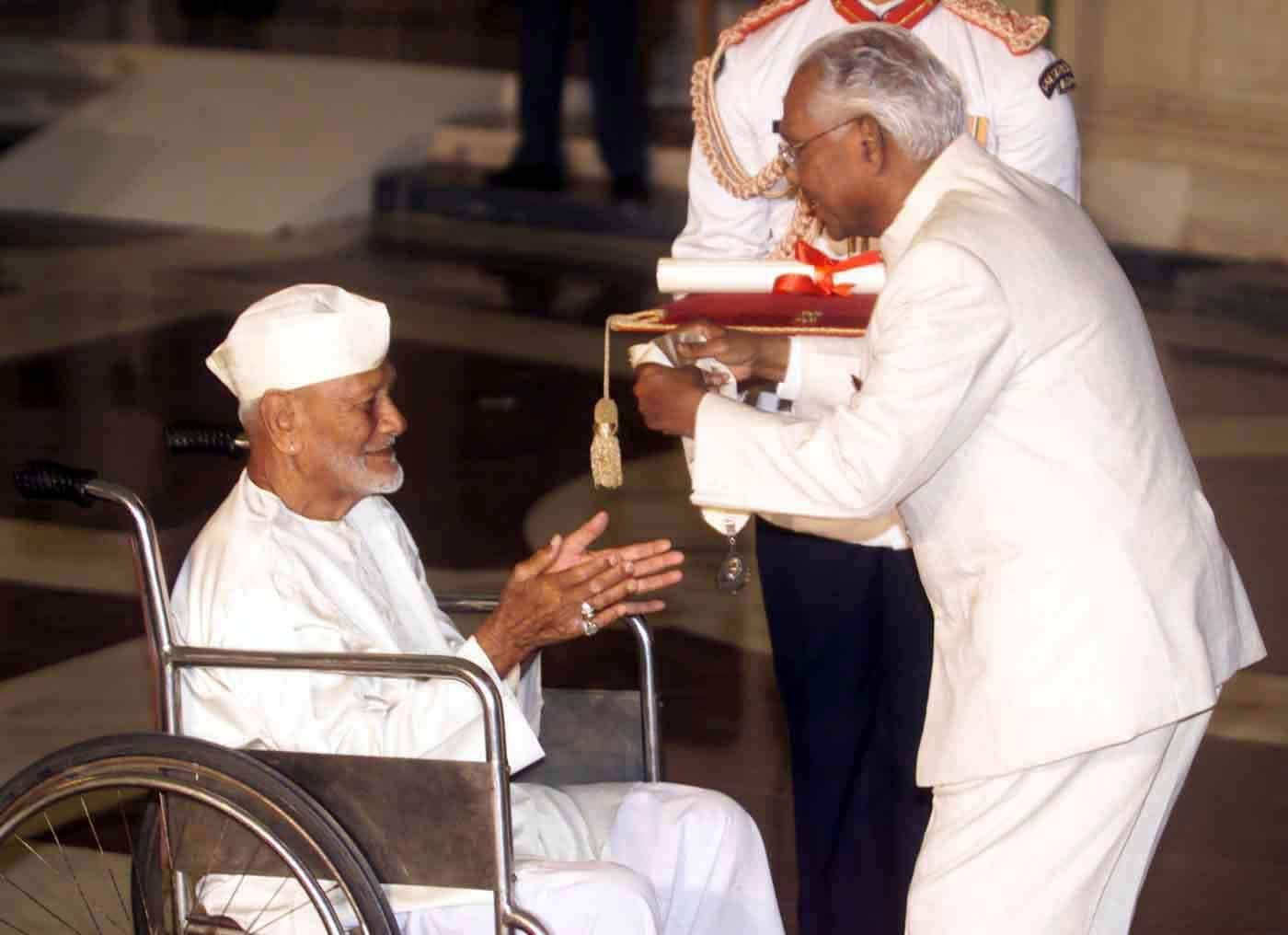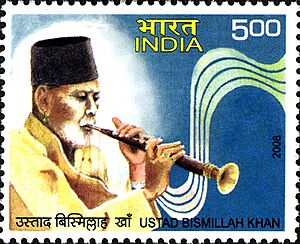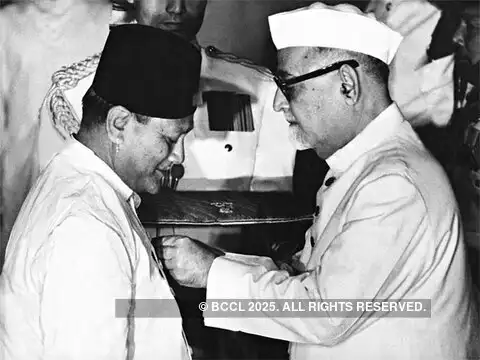
Faiyaz Ahmad Fyzie
Ten years ago, the great Shehnai player Ustad Bismillah Khan passed away. He singularly popularised the Shehnai, and made a place for this humble Indian instrument in the world of Music. Recently, the Geographical Indication (GI) tag for Shehnai once again proved the glory that Ustad Bismillah Khan had bestowed on it and Indian Music.
Ustad Bismillah Khan's musical genius improvised the original Shehnai to bring it to the level of similar other instruments.
Bismillah Khan's shehnai famously heralded India's freedom from the British. India's first Prime Minister, Jawaharlal Nehru, invited the Ustad to the first Independence Day celebrations on August 15, 1947 at the Red Fort of Delhi. Bismillah Khan's magical shehnai added to the grandeur of the celebrations. He also performed at the country's first Republic Day celebrations on 26 January 1950.
His musical journey was a paradox that can only happen in India; the man who so beautifully embodied the spiritual spirit of the holy Hindu city of Banaras through his music happened to be a Pasmanda Muslim.
.jpg)
Bismillah Khan during a recital
He was born as Qamaruddin Khan to Bachai Miyan and Miththan Bibi in Bhirung Sah Gali of Patheri locality of Dumraon town of Buxar district. On seeing the newly born child, his grandfather recited Bismillah, and it became his pet name. In his childhood, Bismillah accompanied his father Bachai Miyan to play the Shehnai in the temple of Bihari Ji inside Dumraon fort. When he was 10 years old, he was sent to his maternal home in Banaras, where he settled.
His grandfather and maternal uncle played the Shehnai during the Aarti at the Kashi Vishwanath temple. His uncle Vilayati Miyan made him his disciple.
The young Bismillah soon became proficient in playing the shehnai. He was soon accompanying his uncle to the Vishwanath temple for aarti recital. Even after becoming famous, he never left playing Shehnai at the aarti time in the temple. Banaras gave him a strong sense of belonging; he invariably returned home to stay connected to the vibes of Benaras after his performances.
Bismillah Khan lived a simple life, never letting success get the better of his art and intellect. He never aspired to amass wealth.
He belonged to the Pasmanda Halalkhor Muslim community (cleanliness community), a Dalit Muslim community in North India. Like most Pasmanda, Bismillah Khan was spiritual; he prayed five times a day and observed fast during Ramazan.
Besides playing the Shehnai at the Baba Vishwanath Temple of Lord Shiva, he did his riyaz (practice) for hours sitting on the banks of the Ganga. His Banarasi fans considered him a worshipper of Allah, Vishwanath Baba, Mata Saraswati, and Ganga Maiyya (Mother Ganga).

Ustad Busmillah Khan receiving Bharat Ratna award from President K R Narayanan
Bismillah considered Ganga as his mother. Just like offering namaaz five times a day, bathing in the Ganga was also compulsory for him. He would take a dip in the Ganga before practising his music on its banks (Ghat) every morning.
Once, Bismillah Khan was invited to a university in America. He was asked to put up his conditions for working as a musician at the University. He replied that he would stay in America only if his mother, Ganga, Vishwanath Baba's temple, and the whole of Banaras could be brought there. The American who spoke to him was left speechless.
When he was abroad, he missed India; when he was in any other part of India, he missed Banaras. Poet Nazeer Banarsi said in his poem, “Hindu ko to yaqeen hai ki musalmaa hai Nazir; Musalmano ko shaq hai ki Hindu to nahi (The Hindu is certain that Nazir is a Muslim, but Muslims suspect him to be a Hindu)
Bismillah Khan has rendered music to many Bollywood movies. His music for Satyajit Ray's Bengali film Jalsa Ghar (1958), Vijay Bhatt's blockbuster film 'Ghoonj Uthi Shehnai' (1959), director Vijay's Kannada film Sanaadi Appanna (1977) - in which the role of a rural shehnai artist was played by superstar Dr. Rajkumar- are considered musical masterpieces.

He also contributed to a Bhojpuri film "Baaje Shehnai Hamaar Angna" (1982), which was shot in his native village Dumraon. He also played shehnai for the soundtrack of Ashutosh Gowariker's film "Swades" (2004), specifically contributing to the song "Yeh Jo Des Hai Tera".
A documentary, 'Sange Meel Se Mulakat', directed by Gautam Ghosh features the Ustad himself and traces his journey from a young Shehnai player to one of India's best.
Despite his contributions, Bismillah was not heavily involved in the film industry. He reportedly disliked the glitz and artificiality of the celluloid world. Bismillah's primary focus remained classical music and the shehnai, which he brought to the concert stage and raised its status.
Awards and honours
Ustad Bismillah Khan was awarded India's highest civilian award, Bharat Ratna, in 2001. It was a unique and pleasant coincidence that a Shehnai player from a Pasmanda Dalit community was awarded India's highest civilian award, "Bharat Ratna" by the President of India K. R. Narayanan, from a Dalit community, on the recommendation of India's Prime Minister, Atal Bihari Vajpayee, who came from the Brahmin community.
He was awarded the Padma Vibhushan in 1980, the Padma Bhushan in 1968, and the Padma Shri in 1961.
Iran honoured Bismillah Khan with the Talar Mausiki Award in 1992. He was also made a Fellow of the Sangeet Natak Academy in 1994. The conferring of awards began in 1937 when he received three medals at the All India Music Conference in Calcutta.
He always declined offers to perform abroad till 1966, but agreed when the Indian government insisted that he perform at the Edinburgh International Festival. This gained him popularity in the West. He performed in Europe and North America, at times at the most prestigious venues, including the Royal Albert Hall in London and Carnegie Hall in New York.
Ustad Bismillah has also performed for global audiences at the Cannes Film Festival, Osaka Trade Fair, and the World Exhibition in Montreal.
Since 1947, his recital has been a compulsory ritual of the August 15 celebrations in Delhi. He played the "mangal Dhun" soon after the customary address of the PM to the nation from the ramparts of Red Fort.
Bismillah's performance was considered the highlight of the Independence Day celebrations for a very long time. Ustad Bismillah Khan was awarded honorary doctorates from Banaras Hindu University and Visva-Bharati University, Shantiniketan.
 Ustad Bismillah Khan receiving Padma Vibhushand from President Fakhruddin Ali Ahmed
Ustad Bismillah Khan receiving Padma Vibhushand from President Fakhruddin Ali Ahmed
On 21 August 2006, at the age of 90, Ustad Bismillah Khan breathed his last. His shehnai was buried with him in Fatman cemetery, under a neem tree. The government declared a day of mourning in his memory. He was given a 21-gun salute farewell at his state funeral by the Indian Army. The government of his home state, Uttar Pradesh, announced that it would establish an academy to honour his memory.
In 2007, the Sangeet Natak Academy instituted 'Ustad Bismillah Khan Yuva Puraskar', for young artists in the field of dance, music, and theatre. On August 21, 2008, the Indian Post released a celebratory postage stamp in his honour.
Prime Minister Narendra Modi also released another special postage stamp depicting Ustad Bismillah Khan in 2016. On his 102nd birth anniversary, Google paid tribute with a doodle to the Ustad.
ALSO READ: V.P. Suhara has taken the Muslim women's battle for rights to the Court
As Ustad Bismillah Khan once said, "Even if the world perishes, music will live on," his legacy is immortal.
The author is a Pasmanda activist and an Ayush Doctor
